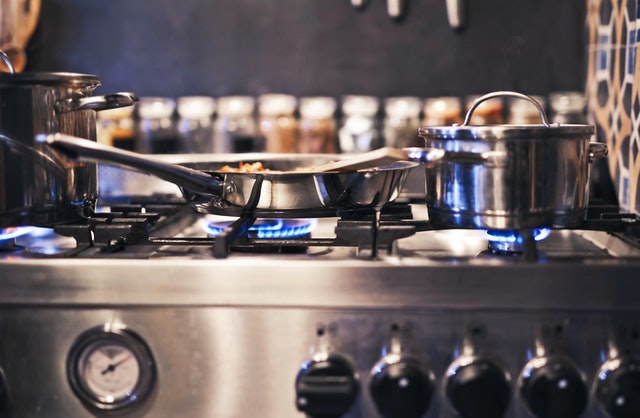When operating a commercial kitchen, one of the chief things to pay attention to is proper handling of your cooking oil. Every aspect must be considered from its transport to storage, hygienic purposes to where the grease might end up. Discarding it down the drainage system can be hazardous to the environment and cause heavy damage on the sewer system, and result in the need for a professional inspection.
As protection, commercial kitchens have turned to installing a grease trap to avoid releasing the oil, fats and grease down the drainage pipes. However, Grease traps need regular maintenance to function properly. A regular cleanup is necessary to remove and separate all the oil and grease. If you smell foul odors or experience overflows in your kitchen, this might be the result of ineffective maintenance of your grease traps.
When running a commercial kitchen, it’s vital to train staff on the proper protocols of disposing of grease. For example, taking the time to wipe away the grease and oil prior to washing the dishes and cooking pans is an important step to keep the grease from being poured down the sink’s drainage pipes
Furthermore, proper oil storage must be observed by selecting the correct holding containers. This leaves your grease traps as the final grease defense system. It’s recommended to engage the services of a cooking oil professional to have your installed grease traps regularly well-maintained.

Once a sewer system issue is discovered and it’s traced to a grease trap in your commercial kitchen, you can expect an inspector to drop by. You must be prepared for the visit in order to prevent further fines. Below are some tips on what to expect during your inspections.
What To Do Prior to an Inspector’s Arrival
Inspectors call on establishments when oil and grease issues are uncovered. This results in owners paying a substantial fine. It’s best to talk and arrange a meeting with your grease trap vendor before the inspector’s visit. This way, you already have an idea on what things you need to focus on.
What Inspectors Examine
An inspector will look for certain issues during their visit. Here are things to be aware of during an inspector’s examination and possible solutions:
Improper fittings and baffle walls
Any issues that deal with the fittings or baffle walls in one’s grease traps can be resolved either through repair or replacement. This means communicating with your grease trap vendor to get the repairs done in proper fashion. Most grease trap vendors may be able to assist or carry out the repairs also.
Temperature of the Water
The water temperature needs to be regulated. It can’t be too hot since hot water will dissolve the oil and grease. It will lead into the grease trap and thus, the sewer system.
Other possible issues that an inspector will focus on during their visit can include:
- The pre-rinse sink, where a huge percentage of grease, fats and oil end up, and other fixtures leading to the grease traps.
- Piping
It should be noted that the inspector will only be focusing on preventing the fats, oil and grease from going into the sewer system. If they spot any of the problems enumerated, you will need to pay the fine.
By getting in touch with your grease trap vendor before the inspector’s arrival, the issue can be rectified by examining the common causes. Scheduling a visit from your vendor every 30 to 90 days can help maintain a proper functioning system. This can help you avoid the costs of fines.

Do a Dye Test
A good way to examine if your grease trap is performing at its full function is to ensure that all the correct fixtures are linked into the grease traps. The grease trap vendor can assist you with this test by using a biodegradable dye.
By releasing a dye, it will be possible to track the its flow in order to determine if the fixtures are draining down to the appropriate the grease traps. If not, you can find a solution before the inspector visits your establishment by consulting your vendor.
Dye testing is a swift solution and does not hamper your kitchen operations. Moreover, it’s safe, natural and easy to wash off.
What to Do When the Inspector Discovers a Problem
The job of inspectors is to make sure that you adhere to the regulations to maintain the sewer system. They work with the owners to help them follow the policies. If they spot problems though, you will need to pay a fine.
What To Do When You are Fined
After receiving a fine, it’s essential to meet with the inspector and grease trap vendor to resolve the issue. Some vendors can also coordinate with the inspector to find a good solution and handle the problem right away. This keeps your sewer system well-protected and ensures that you will be free from being penalized further.

Professional Grease Trap Maintenance and Repair
Installing grease traps and keeping them in top order is crucial for maintaining the sewer system. In addition, you also need to comply with the local laws while operating your commercial kitchen. It’s your business’ responsibility to maintain the functionality of your grease traps. Therefore it would also be beneficial to instruct your staff to periodically examine the grease traps for any signs of damages and blockages.
An excellent method to superbly monitor your grease traps is to hire a professional company whose job is to keep up with its cleanup and maintenance. This ensures your grease traps are always in proper working function.
Summary
Keeping a maintained and functioning grease trap is an important legal requirement for protecting both your business and environment. A regular cleaning and inspection from a trusted grease pumping service can help avoid the escalation into an inspection.
If you would like help with grease disposal in contact the experts at Greasecycle today!